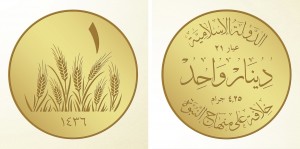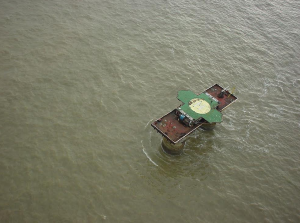The terrorist Islamic State group, known as ISIS or ISIL, has declared itself an independent caliphate. A caliphate is an Islamic country led by a religious leader.
The Islamic State group spokesman Abu Mohamed al-Adnani declared independence in a council meeting earlier this year. The “country” adheres to a strict version of ancient Muslim religious laws.
This is not the first group to claim to be an Islamic caliphate. Many nations have proclaimed to be the true caliphate throughout Middle Eastern history. The last nation to do so was the Ottoman Empire.
The self-named “Islamic State” has taken action to mimic real countries. It has a flag and a coat of arms. It governs a territory, rules a population and commands an army. It also legislates laws and collects taxes.
Recently, the Islamic State group announced the creation and design of its own currency. According to Middle East Monitor News and posters generated by the group, new currency will be printed for the caliphate hopeful. Leader Abu Bakr al-Baghdadi has issued seven types of gold, silver and copper coins to be minted. Each coin has its own design.

But the caliphate hopeful does not issue passports or establish embassies in foreign lands. The Islamic State does not have a United Nations ambassador, and the United Nations does not recognize ISIL as a sovereign nation.
An unofficial requirement to receive sovereign nationhood is to be formally recognized by other foreign nations. The fact that no nation recognizes the sovereignty of the Islamic State hurts its legitimacy for nationhood.
Occasionally groups of people will declare small pieces of land their own country and imitate real nations. These territories, known as micro nations, are not recognized by formal powers.
One such micro nation is called The Principality of Sealand. The principality declared its independence in the 1960s. It has remained independent for more than 40 years, occupying a sea fort off the coast of the United Kingdom. Sealand also has its own flag, government and currency.
The micronation is occupied by the Bates family and their friends. They established a monarchy and claim they are a sovereign state.
The Principality of Sealand mirrors the behavior of recognized nations. It defends its borders, sometimes with military force. As with other micronations, Sealand has not been recognized by any country.

Prince Michael Bates, of The Principality of Sealand, said in an email that formal recognition helps but is not required. “A country, according to the Montevideo Convention, must have territory, population and communication,” Bates said.
Spencer Irvine is a BYU graduate of international relations who specializes in Middle East politics. He said the question of recognition can go both ways. He said that while Israel receives recognition from the United States, many Middle Eastern countries refuse to recognize Israel.
Irvine said recognition is important when it comes to international affairs, treaties and pacts.
In a statement earlier this year President Obama said, “ISIL is certainly not a state … it is recognized by no government, nor by the people it subjugates. ISIL is a terrorist organization, pure and simple. And it has no vision other than the slaughter of all who stand in its way.”
While the Islamic State acts like an established country, the fact that the United States and other western countries identify it as a terrorist organization hurts its legitimacy.
Irvine said he would not classify the Islamic State as a country. “It is more of armed militants and terrorists,” he said, “which have a basic understanding and order and exercise authority by armed force and terror.”
By these blurred definitions, BYU could declare independence. The Vatican City State, led by Pope Francis, has a population of about 800 people. BYU has about 30,000 students.




